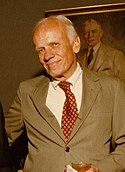Walker Percy Quote
Yes, interest! The worm of interest. Are you surprised? No? Yes? One conclusion I have reached here after a year in my cell is that the only emotion people feel nowadays is interest or the lack of it. Curiosity and interest and boredom have replaced the so-called emotions we used to read about in novels or see registered on actors' faces. Even the horrors of the age translate into interest. Did you ever watch anybody pick up a newspaper and read the headline PLANE CRASH KILLS THREE HUNDRED? How horrible! says the reader. But look at him when he hands you the paper. Is he horrified? No, he is interested. When is the last time you saw anybody horrified?
Walker Percy
Yes, interest! The worm of interest. Are you surprised? No? Yes? One conclusion I have reached here after a year in my cell is that the only emotion people feel nowadays is interest or the lack of it. Curiosity and interest and boredom have replaced the so-called emotions we used to read about in novels or see registered on actors' faces. Even the horrors of the age translate into interest. Did you ever watch anybody pick up a newspaper and read the headline PLANE CRASH KILLS THREE HUNDRED? How horrible! says the reader. But look at him when he hands you the paper. Is he horrified? No, he is interested. When is the last time you saw anybody horrified?
Related Quotes
About Walker Percy
Walker Percy, OblSB (May 28, 1916 – May 10, 1990) was an American writer whose interests included philosophy and semiotics. Percy is noted for his philosophical novels set in and around New Orleans; his first, The Moviegoer, won the National Book Award for Fiction.
Trained as a physician at Columbia University, Percy decided to become a writer after a bout of tuberculosis. He devoted his literary life to the exploration of "the dislocation of man in the modern age." His work displays a combination of existential questioning, Southern sensibility, and deep Catholic faith. He had a lifelong friendship with author and historian Shelby Foote and spent much of his life in Covington, Louisiana, where he died of prostate cancer in 1990.
Trained as a physician at Columbia University, Percy decided to become a writer after a bout of tuberculosis. He devoted his literary life to the exploration of "the dislocation of man in the modern age." His work displays a combination of existential questioning, Southern sensibility, and deep Catholic faith. He had a lifelong friendship with author and historian Shelby Foote and spent much of his life in Covington, Louisiana, where he died of prostate cancer in 1990.
